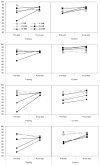Transfer effects in task-set cost and dual-task cost after dual-task training in older and younger adults: further evidence for cognitive plasticity in attentional control in late adulthood
- PMID: 18568979
- PMCID: PMC2845439
- DOI: 10.1080/03610730802070068
Transfer effects in task-set cost and dual-task cost after dual-task training in older and younger adults: further evidence for cognitive plasticity in attentional control in late adulthood
Abstract
Older adults' difficulties in performing two tasks concurrently have been well documented (Kramer & Madden, 2008). It has been observed that the age-related differences in dual-task performance are larger when the two tasks require similar motor responses (2001) and that in some conditions older adults also show greater susceptibility than younger adults to input interference (Hein & Schubert, 2004). The authors recently observed that even when the two tasks require motor responses, both older and younger adults can learn to perform a visual discrimination task and an auditory discrimination task faster and more accurately (Bherer et al., 2005). In the present study, the authors extended this finding to a dual-task condition that involves two visual tasks requiring two motor responses. Older and younger adults completed a dual-task training program in which continuous individualized adaptive feedback was provided to enhance performance. The results indicate that, even with similar motor responses and two visual stimuli, both older and younger adults showed substantial gains in performance after training and that the improvement generalized to new task combinations involving new stimuli. These results suggest that dual-task skills can be substantially improved in older adults and that cognitive plasticity in attentional control is still possible in old age.
Figures




References
-
- Allen PA, Lien MC, Murphy MD, Sanders RE, McCann RS. Age differences in overlapping-task performance: Evidence for efficient parallel processing in older adults. Psychology and Aging. 2002;17:505–519. - PubMed
-
- Allen PA, Smith AF, Vires-Collins H, Sperry S. The psychological refractory period: Evidence fo age differences in attentional time-sharing. Psychology and Aging. 1998;13:218–229. - PubMed
-
- Ball K, Berch DB, Helmers KF, Jobe JB, Leveck MD, Marsiske M, Morris JN, Rebok GW, Smith DM, Tennstedt SL, Unverzagt FW, Willis SL. Effects of cognitive training interventions with older adults: A randomized controlled trial. Journal of the American Medical Association. 2002;288:2271–2281. - PMC - PubMed
-
- Baltes PB, Kliegl R. Further testing of limits of cognitive plasticity: Negative age differences in a mnemonic skill are robust. Developmental Psychology. 1992;28:121–125.
-
- Batsakes PJ, Fisk AD. Age-related differences in dual-task visual search: Are performance gains retained? Journal of Gerontology: Psychological Sciences. 2000;55:332–342. - PubMed
Publication types
MeSH terms
Grants and funding
LinkOut - more resources
Full Text Sources
Other Literature Sources
Medical
